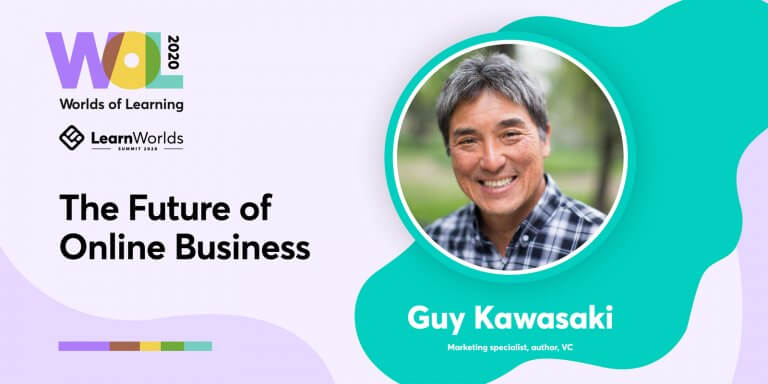Guy Kawasaki on the Future of Business in the Midst of a Pandemic

Table of Contents
During our first event of that scale, we had the pleasure of having Guy Kawasaki as a keynote speaker.
Worlds of Learning 2020 (WOL 2020) was our biggest and most successful virtual summit so far, in the sense that:
Now back to our star, Guy Kawasaki.
For those who don’t know, maybe that’s the youngest members of our audience, Guy Kawasaki is a remarkable business person, a marketing specialist, best-selling author and venture capitalist.
He’s originally from Honolulu and was the chief evangelist of Apple and a trustee of the Wikimedia Foundation.
Today, Guy Kawasaki is the chief evangelist of Canva and the creator of Guy Kawasaki’s Remarkable People podcast.
He is an executive fellow of the Haas School of Business (UC Berkeley), and adjunct professor of the University of New South Wales.
Guy has written:
Guy Kawasaki’s Keynote Speech at WOL 2020
Guy Kawasaki is a world-renowned Keynote Speaker. His clients include Apple, Nike, Gartner, Audi, Google, Microsoft, and Breitling as well as dozens of trade associations. His topics include innovation, enchantment, social media, evangelism, and entrepreneurship.
Some of his famous talks include: The art of innovation at TEDxBerkeley and 12 lessons Steve Jobs taught Guy Kawasaki.
Worlds of Learning is the leading online event for aspiring and seasoned course creators, entrepreneurs and business leaders who only have time for valuable, practical knowledge and the most effective tools to thrive in the new world for e-learning and online businesses.
On day one of WOL 2020, Guy Kawasaki gave an inspiring talk on “The Future of Online Business”.
He shared his 10 ideas about how to not only survive and persevere in a pandemic, but also thrive and come out the other side stronger than ever.
But before we dive into the wisdom that Guys share with generosity, let’s quickly mention his new remarkable project that you wouldn’t want to miss.
Guy Kawasaki’s Remarkable People Podcast
Guy Kawasaki’s latest project, the Remarkable People podcast is a source of inspiration and deep learning.
With more than 60 episodes already, Guy gives his audience the opportunity to dive into the remarkable minds of people who have made history with their exhilarating actions, uncommon stories and ideas that have made the world better.
The podcast features interviews with thought leaders, legends, and iconoclasts such as Jane Goodall, Philip Zimbardo, Stephen Wolfram, Margaret Atwood, Woz, Martha Stewart, and Leon Panetta.
From each of them, Guy is trying to bring out their wisdom.
So, Jane Goodall talks about how you build trust. Building trust with chimpanzees I don’t think is that much different than building trust with humans. So, there’s the lesson of Jane Goodall. She didn’t have the “proper” education to do what she did. She didn’t even have a college degree, at all, when she went to Africa.
With Phil Zimbardo, the Stanford professor who did the Stanford Prison Experiment, the major lesson is you can take perfectly good people, stick them in a bad situation, and they will become bad, too.
Every episode will make you a little more remarkable, so take a minute to subscribe and leave a rating.
10 principles of the Future of Online Business from Guy Kawasaki
The principles are:
1Understand what kind of race you’re running
Some people would like to think that the effect of the pandemic in online business is a sprint, like 100 yards or 100 metres. It’s going to end soon. Guy doesn’t think so. His view is that we are running a marathon. And a marathon is a completely different skill set. Plus, it’s the long haul.
So the first piece of advice Guy shares is: Orient your perspective right!
2Eat your cows
Next thing is: No matter what business you’re in, whether you are an educator, content creator, you make socks, computers, food, whatever it is, cash is king right now and you have to eat your cash cows.
A cash cow is a business metaphor for a product or service that produces consistent cash flows over its lifespan.
3Kill your dogs
So, as Guy Kawasaki states in his keynote speech, it’s all about survival and to survive, you have got to eat your cash cows, you also have to kill your dogs.
And by this he means when you have products or online courses that just aren’t selling, now is the time to get rid of them.
Kill the dogs in your portfolio! Just a metaphor of course because we love dogs and cows.
4Simplify your product offerings
This is the flipside of eating your cows and killing your dogs. Guy gives an example that applies to all businesses:
Before the pandemic, peanut butter used to be creamy, chunky, super chunky, GMO, non GMO, organic, inorganic, you name it. There have to be 75 kinds of peanut butter.
Well in a pandemic, guess what…
You order one type of peanut butter and you receive another type or even another brand. And you know what, you’re not upset, you’re not angry, you’re thankful that you got any peanut butter at all.
You can simplify your product offerings right now, you don’t have to have every course on your online school website because simplicity is a real benefit these days.
5Do business directly
This is probably true for online course creators. However, it’s an important lesson to learn that what you need to do is try to do business directly.
Take that step and get closer to your customer because you don’t want someone else controlling your fate.
That’s one of the powers of the online course business. There’s no need for a middleman.
6Tap your base
An offshoot of the previous point is: The easiest customer to sell something to someone you’re already doing business with, right?
But there’s also the bright shiny new customer.
“Man, I’ll tell you right now, tap your base, tap your base.” Guy says.
7Figure out shipping
Luckily, for online course creators there’s usually no struggle to figure out shipping, especially if they deliver the product only digitally. You know that during the pandemic shipping and delivery tracking was problematic.
Lesson learned here is make sure your product ships as fast as possible. This is a real feature today.
8Make a commitment
We truly have to make a commitment to online education, online literacy, content, professionalism, all that good stuff.
We’re going to look back at this pandemic. And there’s many bad things that happened because of it, the death, the pain, the suffering, but some other things such as online education, such as content development, such as doing business directly simplifying product lines, simplifying supply chains, those are some good things.
So, ask yourself: Are you totally committed? Have you learned new skill sets? Have you learned how to communicate well, virtually?
9Ask, “Therefore, what?”
And this is an important one.
You look at your industry, you look at the potential of it, you look at that the problems of it, you look at, you know what you think is going to happen, how this is changing, that kids can’t go back to college, it can’t go back to school that they have to be taught virtually, that people may no longer see the value of spending, you know, hundreds of thousands of dollars to go to college, that they they aren’t going to be travelling, they’re not going to be flying all over the place and all this kind of stuff.
So, you look at all those factors.
And you say to yourself: Therefore what should I do? What product? What service? How should I change my business?
That’s how great innovation, great companies, great services, great success happens to you; Analyze what’s happening, and you say to yourself: “Therefore, what?”
10Get high and right
This is not drugs or politics.
Imagine a graph like this: Vertical axis measures the uniqueness horizontal axis measures the value.
If you’re in the lower right corner you have something useful but not unique. You always have to compete on price.
In the upper left hand corner that’s where you have something truly unique but it’s not valuable there you just stupid you own a market that doesn’t exist.
The bottom left corner is even worse. There you have something that’s not valuable
So the corner you want to be in for online business, online education, course creation, learning whatever it is life, even a spouse, employment as an employee, you want to be in the upper right hand corner of this graph where you are unique and valuable.
We hope that these 10 principles of the future of online business, or really business, or life are applicable to you and you can take this and run with it and change the world.
Watch the full talk here to feel the vibe and get to listen to real-life stories from the amazing Guy Kawasaki.

Stella Mikraki, BSc. Econ., MBA
Stella is a Senior Growth Marketing Manager at LearnWorlds. She has a background in consulting firms, service-based businesses, media, tech companies, and startups. She has also been an entrepreneur and corporate trainer. She loves all things entrepreneurship, technology, basketball, and the sea.





